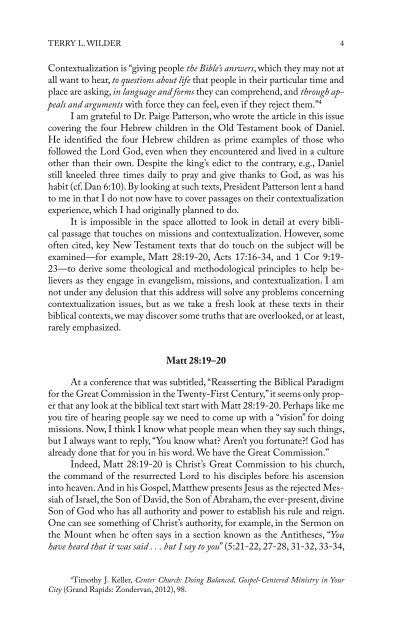The Theology of Missions
The Theology of Missions
The Theology of Missions
Create successful ePaper yourself
Turn your PDF publications into a flip-book with our unique Google optimized e-Paper software.
Terry L. Wilder 4<br />
Contextualization is “giving people the Bible’s answers, which they may not at<br />
all want to hear, to questions about life that people in their particular time and<br />
place are asking, in language and forms they can comprehend, and through appeals<br />
and arguments with force they can feel, even if they reject them.” 4<br />
I am grateful to Dr. Paige Patterson, who wrote the article in this issue<br />
covering the four Hebrew children in the Old Testament book <strong>of</strong> Daniel.<br />
He identified the four Hebrew children as prime examples <strong>of</strong> those who<br />
followed the Lord God, even when they encountered and lived in a culture<br />
other than their own. Despite the king’s edict to the contrary, e.g., Daniel<br />
still kneeled three times daily to pray and give thanks to God, as was his<br />
habit (cf. Dan 6:10). By looking at such texts, President Patterson lent a hand<br />
to me in that I do not now have to cover passages on their contextualization<br />
experience, which I had originally planned to do.<br />
It is impossible in the space allotted to look in detail at every biblical<br />
passage that touches on missions and contextualization. However, some<br />
<strong>of</strong>ten cited, key New Testament texts that do touch on the subject will be<br />
examined—for example, Matt 28:19-20, Acts 17:16-34, and 1 Cor 9:19-<br />
23—to derive some theological and methodological principles to help believers<br />
as they engage in evangelism, missions, and contextualization. I am<br />
not under any delusion that this address will solve any problems concerning<br />
contextualization issues, but as we take a fresh look at these texts in their<br />
biblical contexts, we may discover some truths that are overlooked, or at least,<br />
rarely emphasized.<br />
Matt 28:19–20<br />
At a conference that was subtitled, “Reasserting the Biblical Paradigm<br />
for the Great Commission in the Twenty-First Century,” it seems only proper<br />
that any look at the biblical text start with Matt 28:19-20. Perhaps like me<br />
you tire <strong>of</strong> hearing people say we need to come up with a “vision” for doing<br />
missions. Now, I think I know what people mean when they say such things,<br />
but I always want to reply, “You know what? Aren’t you fortunate?! God has<br />
already done that for you in his word. We have the Great Commission.”<br />
Indeed, Matt 28:19-20 is Christ’s Great Commission to his church,<br />
the command <strong>of</strong> the resurrected Lord to his disciples before his ascension<br />
into heaven. And in his Gospel, Matthew presents Jesus as the rejected Messiah<br />
<strong>of</strong> Israel, the Son <strong>of</strong> David, the Son <strong>of</strong> Abraham, the ever-present, divine<br />
Son <strong>of</strong> God who has all authority and power to establish his rule and reign.<br />
One can see something <strong>of</strong> Christ’s authority, for example, in the Sermon on<br />
the Mount when he <strong>of</strong>ten says in a section known as the Antitheses, “You<br />
have heard that it was said . . . but I say to you” (5:21-22, 27-28, 31-32, 33-34,<br />
4<br />
Timothy J. Keller, Center Church: Doing Balanced, Gospel-Centered Ministry in Your<br />
City (Grand Rapids: Zondervan, 2012), 98.

















